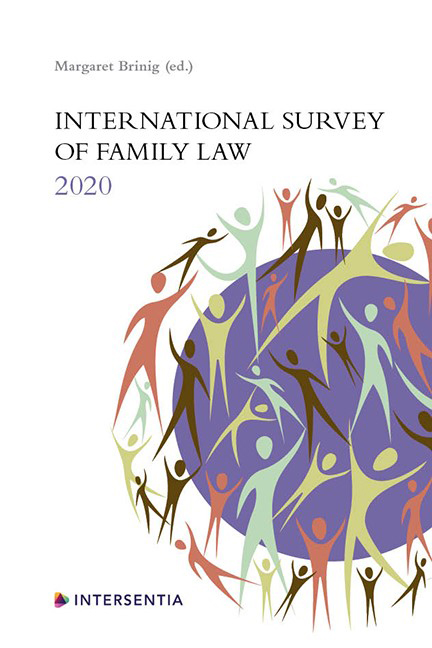Book contents
- Frontmatter
- Preface
- Contents
- List of Contributors
- Australia: The Search for Property in the Labyrinth of the Discretionary Trust
- Brazil: Intuitu Personae Adoption in the Brazilian Legal System
- Canada: Family Law at the Supreme Court of Canada
- China: Reform of the Marriage and Family Part of the Civil Code in China
- England and Wales: Beware of International Relationships
- European Court of Human Rights: Challenging Paternity under Case Law of the European Court of Human Rights
- France: A Chronicle of French Family Law: 2019
- Germany: Gender Identity, Sexual Orientation and Parentage: Family Law Lagging Behind
- Hong Kong: Hong Kong Family Law Today: Drowning not Waving?
- Korea: Full Guardianship in Korean Law: An Evaluation Over Seven Years from the Perspective of Family Court Practices and the Constitution
- Norway: The New Norwegian Adoption Act
- Poland: Discussion and Reform of Family Law in Poland
- Scotland: Making Scotland ‘The Best Place in the World to Grow Up’?
- Serbia: Child Maintenance and Welfare in Serbian Law
- Slovenia: New Regulation on Guardianship for Adults in Slovenia
- South Africa: Aspects of Dutch Colonial Family Law Related to the Indonesian Rajah of Tambora’s Exile at the Cape
- Sweden and California: On Children’s Rights to be Heard in Custody and Support Matters
- UN Committee on the Rights of the Child: Continued Reflections on Family Law Issues in the Jurisprudence of the CRC Committee: The Convention on the Rights of the Child @ 30
- Index
Slovenia: New Regulation on Guardianship for Adults in Slovenia
Published online by Cambridge University Press: 09 February 2021
- Frontmatter
- Preface
- Contents
- List of Contributors
- Australia: The Search for Property in the Labyrinth of the Discretionary Trust
- Brazil: Intuitu Personae Adoption in the Brazilian Legal System
- Canada: Family Law at the Supreme Court of Canada
- China: Reform of the Marriage and Family Part of the Civil Code in China
- England and Wales: Beware of International Relationships
- European Court of Human Rights: Challenging Paternity under Case Law of the European Court of Human Rights
- France: A Chronicle of French Family Law: 2019
- Germany: Gender Identity, Sexual Orientation and Parentage: Family Law Lagging Behind
- Hong Kong: Hong Kong Family Law Today: Drowning not Waving?
- Korea: Full Guardianship in Korean Law: An Evaluation Over Seven Years from the Perspective of Family Court Practices and the Constitution
- Norway: The New Norwegian Adoption Act
- Poland: Discussion and Reform of Family Law in Poland
- Scotland: Making Scotland ‘The Best Place in the World to Grow Up’?
- Serbia: Child Maintenance and Welfare in Serbian Law
- Slovenia: New Regulation on Guardianship for Adults in Slovenia
- South Africa: Aspects of Dutch Colonial Family Law Related to the Indonesian Rajah of Tambora’s Exile at the Cape
- Sweden and California: On Children’s Rights to be Heard in Custody and Support Matters
- UN Committee on the Rights of the Child: Continued Reflections on Family Law Issues in the Jurisprudence of the CRC Committee: The Convention on the Rights of the Child @ 30
- Index
Summary
Résumé
Après quarante ans, la Slovénie a finalement adopté un nouveau Code de la famille, qui apporte de nombreuses nouveautés. La tutelle des majeurs est l’une des plus importantes, puisqu’elle ne dépend plus de la perte de la capacité juridique. Si une personne majeure n’est pas capable de s’occuper de ses droits et prestations, elle doit être placée sous tutelle, mais elle ne doit plus être privée de sa capacité juridique. Cette personne devrait bénéficier de toute l’aide et de tout le soutien possibles pour conserver un maximum d’autonomie en fonction des circonstances qui lui sont propres. L’article souligne les principaux changements liés à la tutelle des adultes.
INTRODUCTION: NEW LEGISLATION ON FAMILY LAW MATTERS
Until April 2019, the main statute regulating family law in Slovenia was the Marriage and Family Relations Act (MFRA), adopted in 1976. The MFRA has been revised several times (1989, 2001, 2004), and two last revisions were mostly dedicated to changes regarding child law. On 23 March 2017, after almost a decade of negotiation and cooperation and two legislative referendums, the new Family Code (FC) was finally adopted. The new FC (with some exceptions) came into force on 15 April 2019. Slovenia also adopted, on 21 April 2016, new legislation regulating civil unions. The Civil Union Act (CUA) replaced the Civil Partnership Registration Act (CPRA) in 2005. Today, partners in same-sex civil unions have all the legal rights of spouses in marriages, with three exceptions. They cannot enter into marriage, or jointly adopt a child in Slovenia, or access in vitro fertilisation procedures in Slovenia (Articles 2(3) and 3(3) CUA).
Because the Slovenian FC transferred jurisdiction in many family matters to non-contentious courts governed by non-contentious procedures, the adoption of a new legal act was necessary for coordinated actions in court proceedings. On 6 March 2019 the Non-Contentious Civil Procedure Act (NCCPA-1) was adopted. The FC and the NCCPA-1 took effect from the same date (15 April 2019), ensuring that these two laws were coordinated.
THE PURPOSE OF GUARDIANSHIP FOR ADULTS
Prior to the adoption of the FC, guardianship for adults in Slovenia fell within the jurisdiction of social work centres (SWC).
- Type
- Chapter
- Information
- International Survey of Family Law 20202020 Edition, pp. 251 - 264Publisher: IntersentiaPrint publication year: 2020



